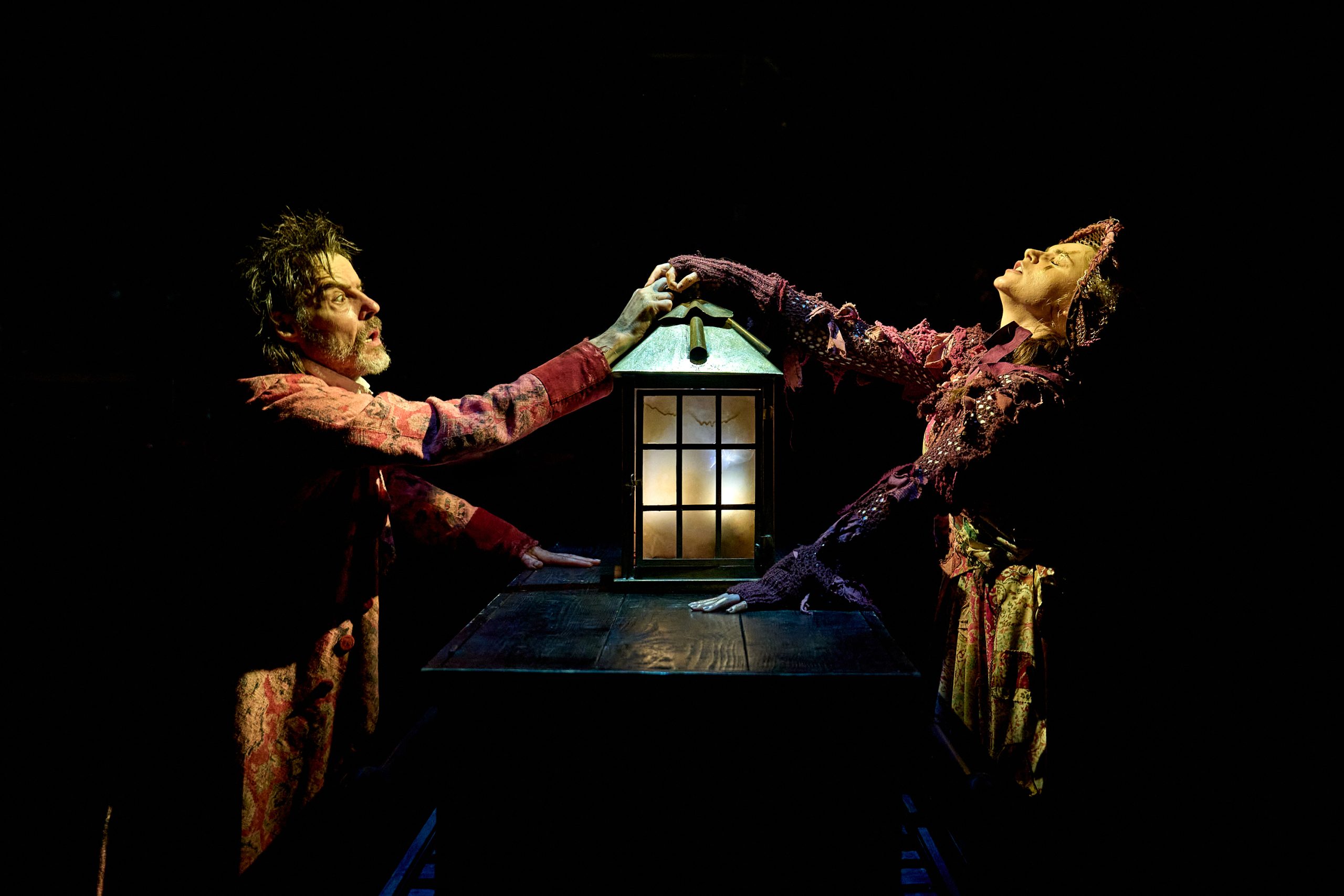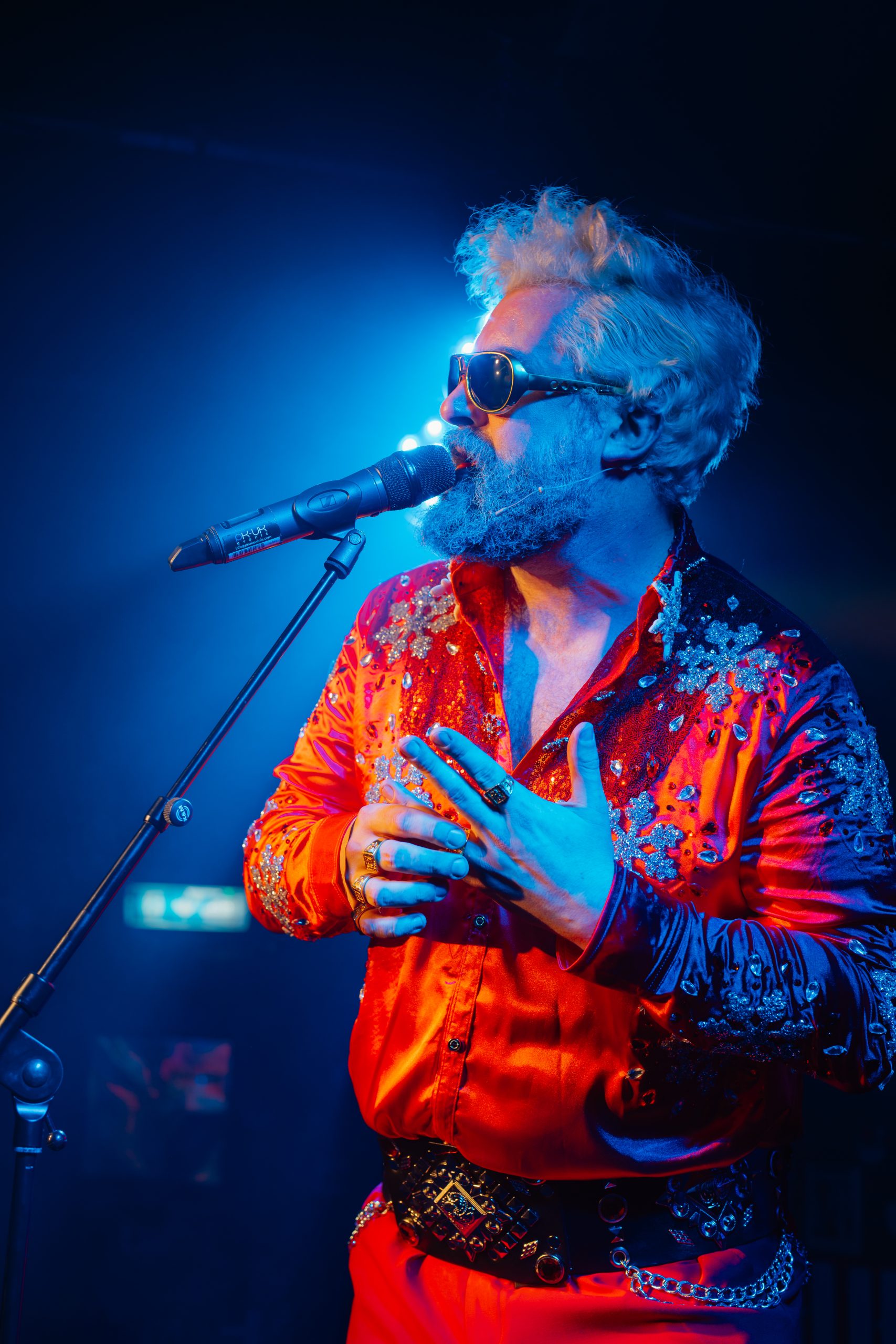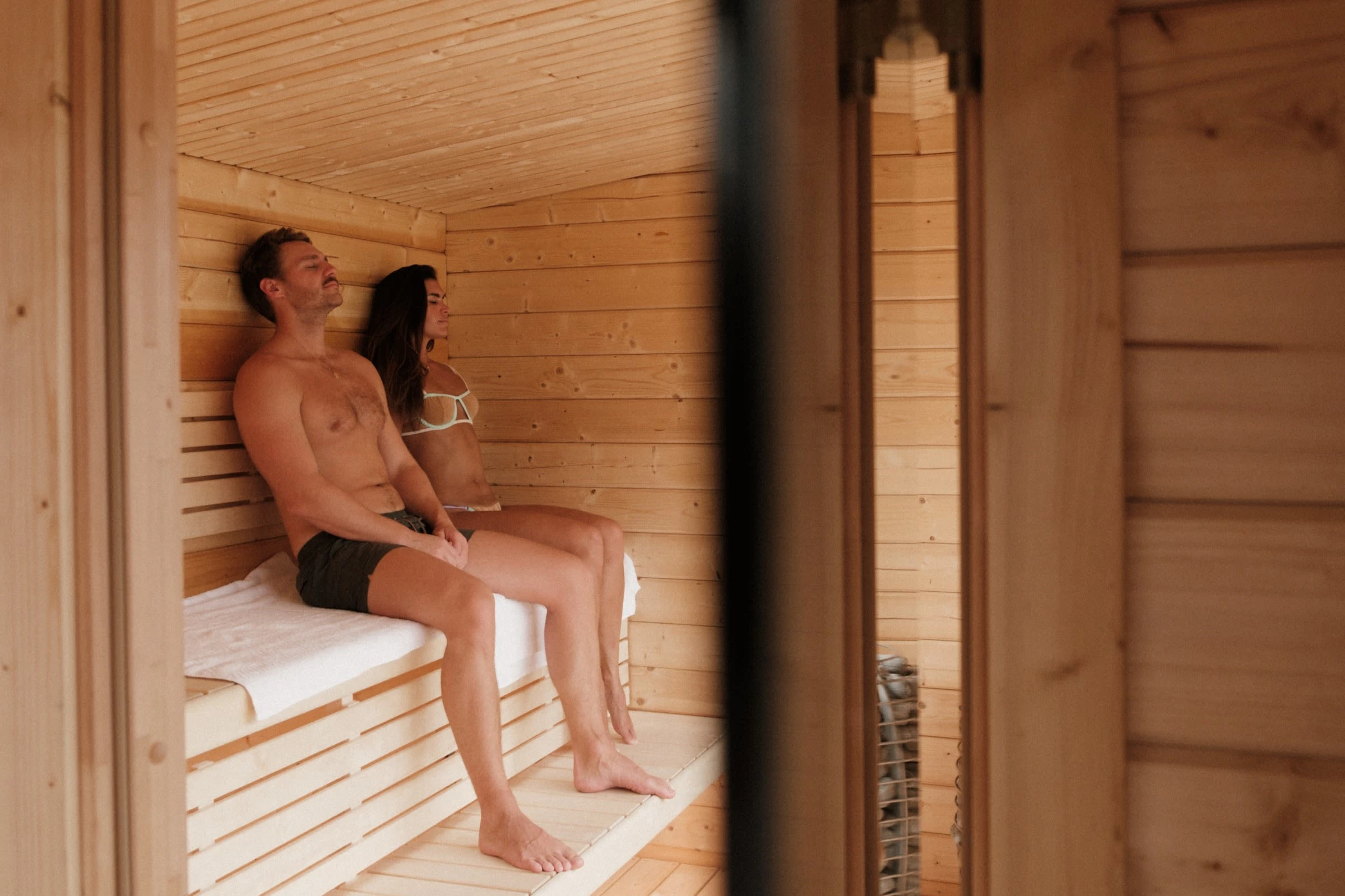This Bitter Earth first premiered in San Francisco in 2017, but its themes of love, identity, protest, and the complexities of allyship feel no less vital in 2025. Written by Harrison David Rivers, the play follows Jesse – a Black playwright quietly grappling with activism – and Neil, his white boyfriend whose passionate engagement is heartfelt, if sometimes misjudged.
Now revived at Soho Theatre with Billy Porter directing, the play arrives in London with new visibility and power. I saw it on opening night (after this interview took place) and was blown away by Porter’s innovative direction, the emotional precision of Omari Douglas and Alexander Lincoln, and the way Morgan Large’s video projections transformed a simple set into something poetic and alive. I was moved in every possible way.
I spoke to Harrison David Rivers about returning to the piece, the evolution of its meaning, and the emotional truths that continue to reverberate through it.
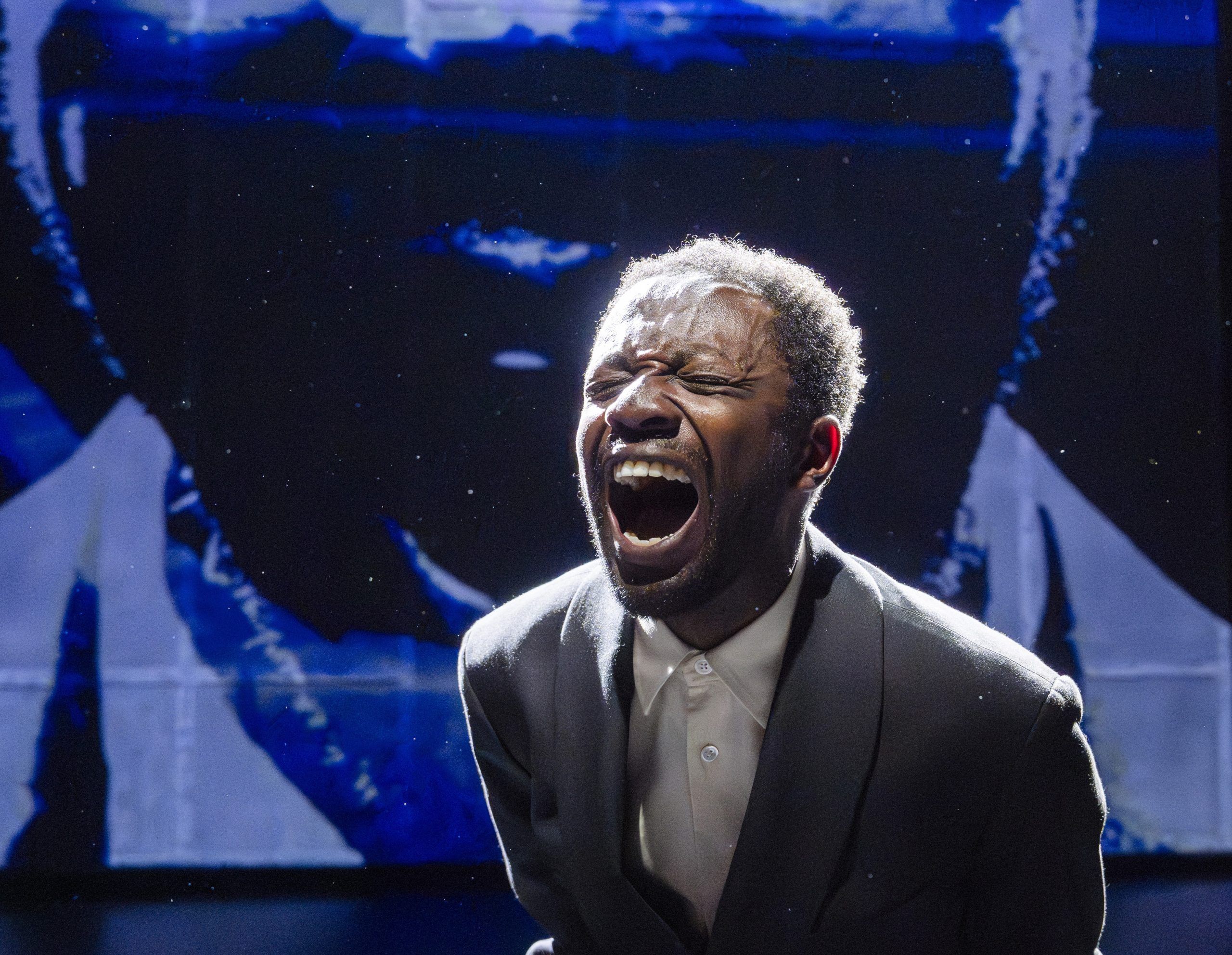
This Bitter Earth has been staged in London before, but the Soho run arrives with a very different kind of visibility. What’s it been like seeing it return now, with Billy Porter directing?
It’s surreal. The world feels darker again – scarier, a bit bleaker. That saddens me, but it also feels like a gift: to revisit the work when people seem more willing to have the conversation. The play has always asked how we meet each other in discomfort – and right now, that feels more urgent than ever. The world’s noisy, no one’s really listening, and this story says: step out of your comfort zone, meet someone where they are, and choose love.
We’ve kept the original timeline – 2012 to 2015 – but Billy brings a powerful sense of now. He directs with urgency. Even the rewrites feel immediate. The story hasn’t changed, but the stakes feel different in 2025 – and we’re finding new ways to say what needs saying.
I just finished reading the play last night – and I’m still sitting with it. You mentioned rewrites earlier – what kind of changes have you made in this version?
Thank you for reading it. There were things missing from the original – moments that needed to be clearer or more emotionally complete. Not to wrap everything up neatly, but to show these men reaching for each other. Even if they haven’t figured it all out, we need to see them trying. There’s more physicality in this version – more touch, more stillness, more presence. Not choreographed, but intentional. You can’t move through the world alone, and even if your partner is part of the problem, they might still be your anchor. If you hold on long enough, maybe you can get through it together.
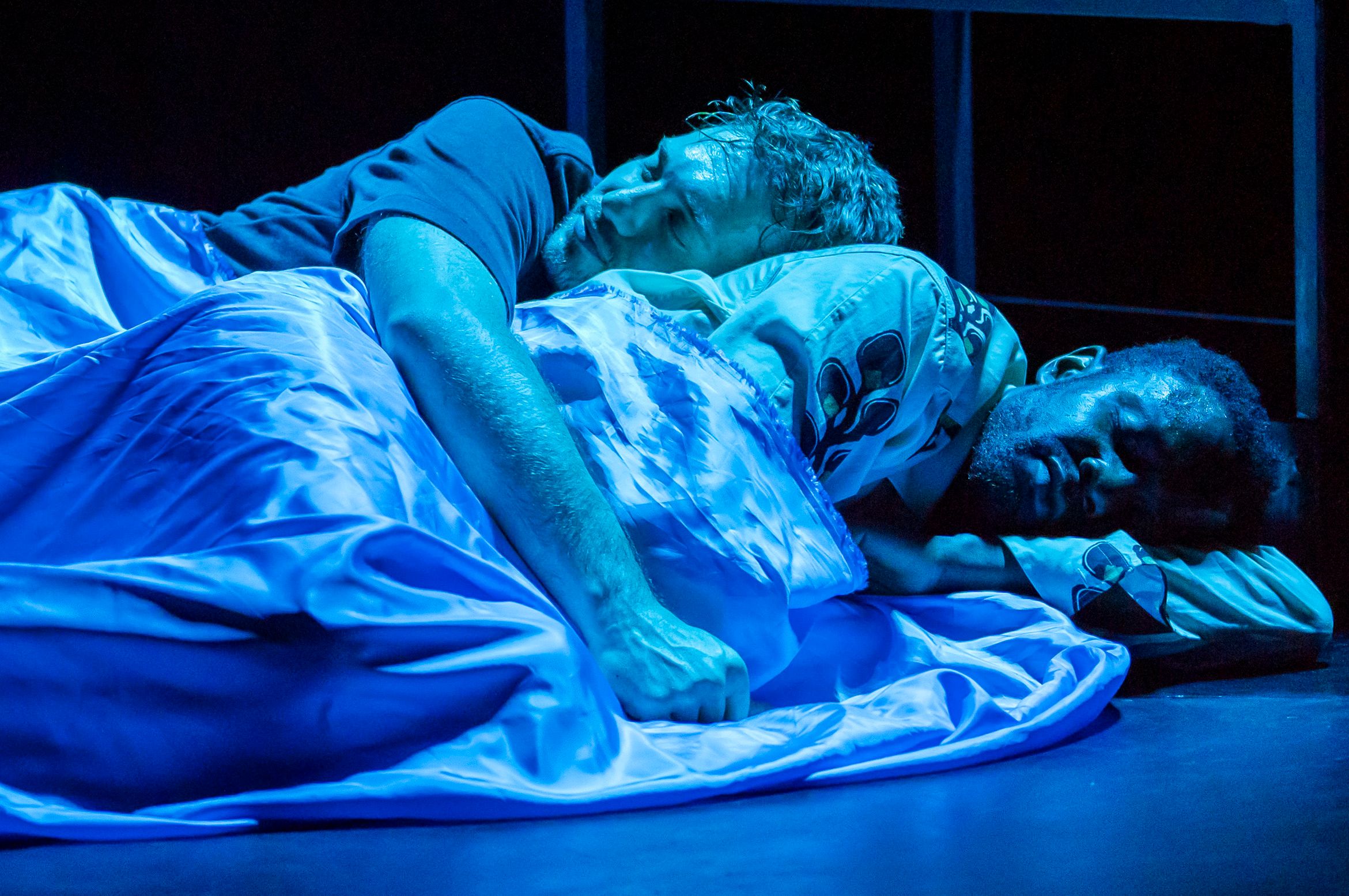
Your writing is deeply political, but also deeply romantic. Are you a romantic yourself?
I am, though my husband is even more so. He encourages me to be softer, which I appreciate. My guard is often up more than his – and there are reasons for that. He’s a white man, and we move through the world differently. He’s aware of that. We ebb and flow around it, adjusting where we need to. The play isn’t autobiographical, but it’s personal. Some moments are modelled on us – conversations we’ve had, the first time we met my parents. It’s not a documentary, but it’s close to home.
You wrote This Bitter Earth before George Floyd’s murder, but names like Trayvon Martin, Michael Brown, Eric Garner, Tamir Rice – they’re in there. Did 2020 change how the play sits with you?
It did. There was a surge of mobilisation, especially among Black people and people of colour. George Floyd’s murder hit differently – it felt close, immediate. I’ve always struggled with videos like that, but this one cracked something open. At first, I thought the play might end up as a kind of time capsule – something we’d revisit once we’d moved on. But the fact it still feels so current, so necessary… that breaks my heart. It felt urgent then. It feels urgent now. The message was always: we have to do better. Jesse and Neil are trying to love across a divide – one they don’t always see. But they’re reaching for each other. That’s the hope. That saving each other is still possible.
We also got permission to use Essex Hemphill’s For My Own Protection, which speaks to this directly. We can’t save ourselves. We save each other. That’s the heart of it.
Saving each other is the heart of it – were there early moments with Christopher that shaped that?
Yes – two that really stayed with me. I’d just moved from New York to St. Paul and felt constantly on edge. I grew up in a pretty sheltered environment and didn’t always recognise danger. One day, we were walking hand-in-hand – which we rarely do, because I overheat fast – when an SUV screeched to a stop beside us. We froze. But then a woman leaned out and shouted, ‘I love love!’ She was beaming. It was terrifying and beautiful at the same time.
Another time, a man shouted slurs at us – racist and homophobic. Christopher was furious, but I told him it wasn’t worth it. That man didn’t get to ruin our day. Those moments stayed with me. Fear, love, defiance – it’s all there in the DNA of the play.
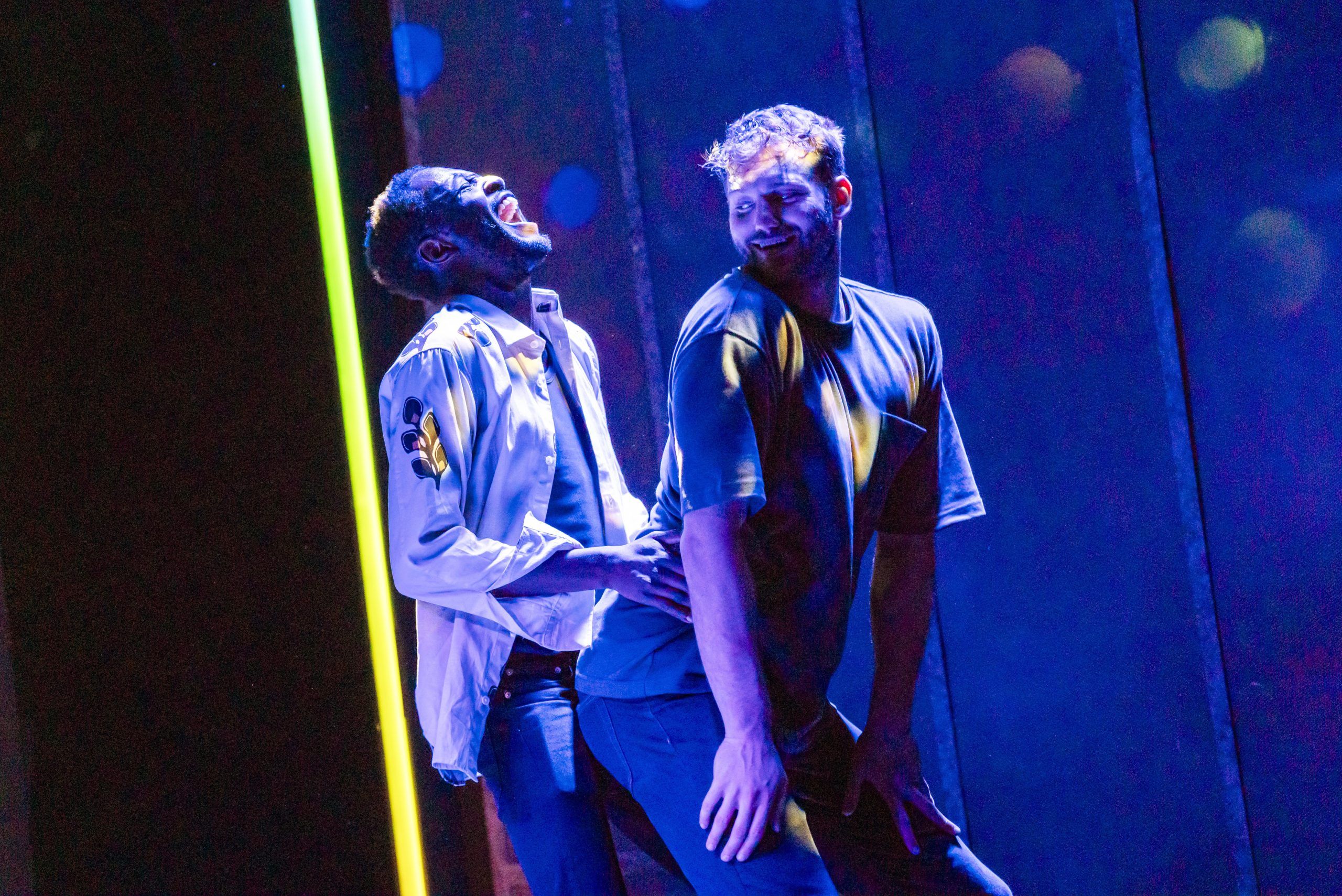
Do you think Jesse’s carrying some of that too – holding it in?
Definitely. There’s a line where he says, ‘Do I feel like killing someone every day? Yeah. But you can’t.’ That tension – between rage and survival – is central. Billy’s direction leans into it. People get scared when a Black man is angry, especially when he names what it’s like to be distrusted. Omari captures that beautifully. When he lets go, it’s cathartic. I hope people of colour in the audience feel that release – and maybe give themselves one too.
Jesse’s often so composed. But those moments of unguarded emotion – when he unbuttons – feel huge. Do they feel vulnerable to write?
Yes. Hugely. He’s usually very buttoned up, very guarded. That’s how he survives. But when he does open up, when he stretches out emotionally or physically, those are the moments I’ve come to love – and also the ones that scare me most as a writer. Because they feel very close to me.
Earlier we mentioned the names – Trayvon, Michael, Eric – which are spoken aloud in the play. Was it important to you that the audience hear those names and that they be held in that space?
Yeah. It’s important that their names are spoken and their lives remembered. In the context of the play, they also serve a structural purpose – they orient the audience, grounding us in time and place. But beyond that, each name becomes the bedrock for whatever rupture or reckoning is happening between these two men. This person has been murdered – we name him – and then we deal with the mess that surfaces in our relationship. What does it bring up? What does it fracture? What does it expose? Or even, sometimes, what does it bring us closer through?
In the early days of my relationship with Christopher, those names – those men – were with us. We were mourning them, talking about them. They were part of the air we breathed in our home. That doesn’t define our relationship, but it shaped it. I look at this play and I see us – the questions we were asking, the way the world felt, the weight we carried. I see the moments where he missed me a little, and the moments where we found each other anyway.
Maybe that’s the gift of revisiting the play now – I get to look back at who I was, who we were, and reflect. It’s a reminder of the foundation we built. And now, being where we are, I think we can approach things differently. We’re more on the same page about how we move through the world today – because of what we figured out back then.
In a past interview, you said that writing This Bitter Earth was your way of standing up. Has your sense of what activism looks like changed since then?
It’s totally broadened. I used to think that if I wasn’t on the front lines – with a sign, with my fist raised – I wasn’t really doing anything. I felt a bit outside of the Black Lives Matter movement. But writing the play – and writing Jesse, who shares that same tension – made me realise the writing itself was a form of activism.
Sometimes just getting out of bed and moving through the world, even when you’re afraid, is its own form of resistance. That’s how I contribute. And I’ve come to feel that activism isn’t one-size-fits-all. People show up in different ways – through art, music, dance, rage, care. Through growing food, feeding people, looking after each other. That’s protest too. That’s love. As Essex Hemphill says: take care of your blessings. Give back the things only you can give. That counts.
You’ve described theatre as a kind of church before. What does that space mean to you, especially with a story like this one?
I grew up in the church, and while it’s not really home for me anymore, there are parts of it I still carry with me – especially the music. I used to get this full-body, tingly feeling when we sang hymns in harmony. I get that same feeling in the theatre. It’s like something is moving, something is changing – hearts are cracking open.
I love being in that space with an audience while the spirit is moving. I hope my plays can be part of that – can make people laugh, gasp, cry – even just tingle. That shared experience feels sacred. Like, we’re all sitting there, and you glance sideways and realise the person next to you is having a moment too. That kind of communion, that togetherness – it’s spiritual to me.
If we spent more time in spaces like that, having collective emotional experiences, maybe the world wouldn’t feel so fractured.
Jesse isn’t passive, but he processes things inwardly. Was it important for you to explore that kind of quiet resistance – the refusal to perform outrage in the expected way?
Yeah. I think part of it is that I hadn’t really seen Black queer male characters who move through the world like me. And because I hadn’t seen that, I think I felt a little ashamed of how I moved through the world – quiet, thoughtful, more inward. Less inclined to put myself out there or join the fray.
There’s so much power in being loud and proud, and I have huge respect for that. But I think some of us need to see our quieter selves reflected too – the ones still wrestling with where we fit in, how we add to the ecosystem.
That was the motivation behind Jesse – to show that kind of character. Someone still contributing, still engaged, but not in a way that’s always expected. Hopefully, there are people in the audience who see him and think, yeah, that’s me too. I might be quiet, but that doesn’t mean I don’t have a loud, powerful voice.
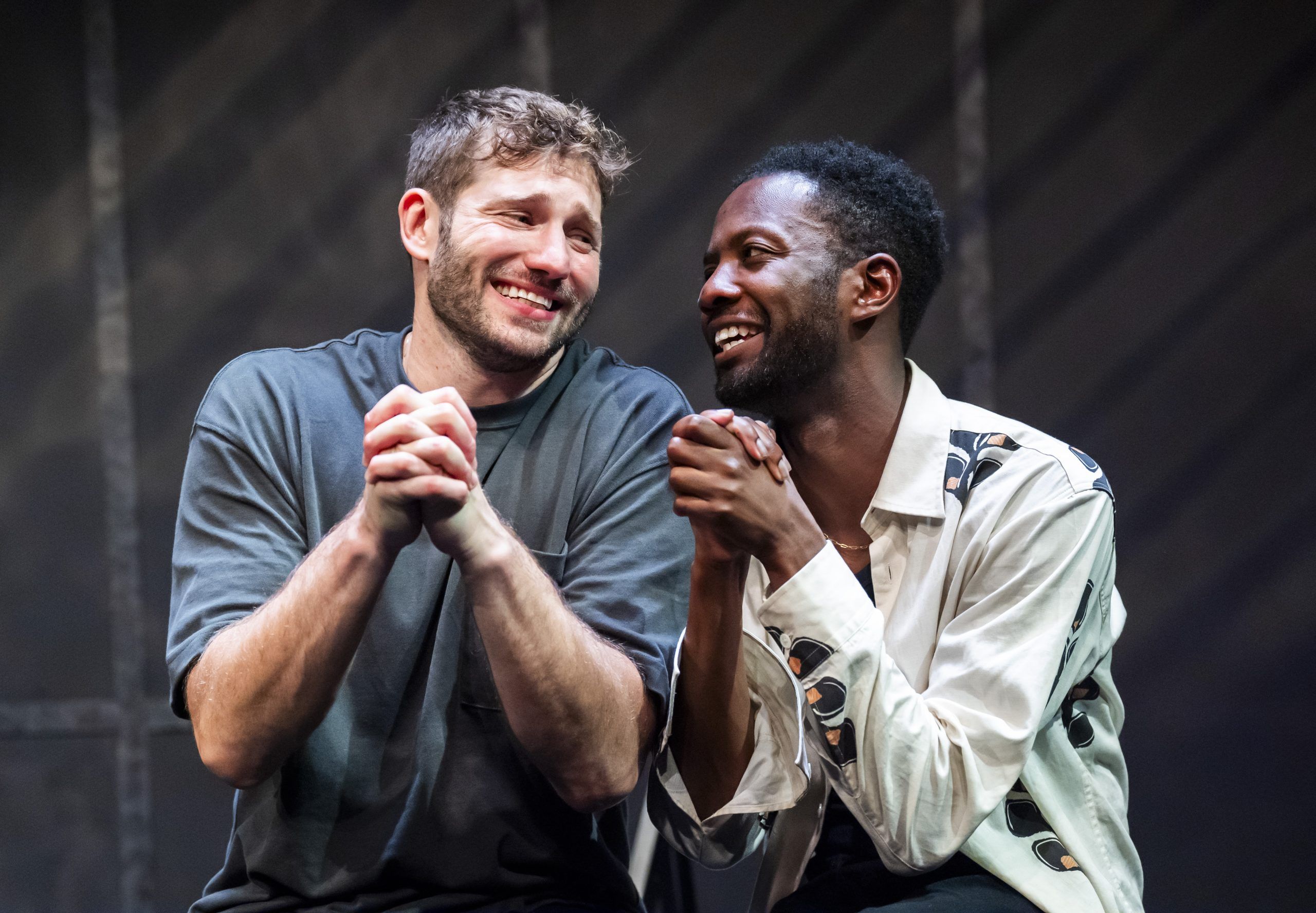
I had to laugh when you said you don’t put yourself out there – you’re writing plays being performed for thousands! You’re just not at the front of the room.
Exactly. Even in the rehearsal room, I think of the play as a blueprint – I’ve built the frame, the structure. Then I step back and it’s the director, the actors, the designers who fill it out, who make it a home.
I love watching that. Watching something I’ve scaffolded become a living, breathing thing – that’s the thrill. The text is important, of course, but it’s really about how life gets breathed into it. That’s not my job. I just get to be nearby and watch these amazing people bring it to life.
Each production of This Bitter Earth seems to have had its own flavour. Reading it, I kept wondering how you’d make it clear what time we’re in. It reminded me a little of Shifters by Benedict Lombe – a wonderful two-hander which also has a fluid timeline.
I read Shifters – it’s gorgeous. I didn’t see it, but I loved the script.
With This Bitter Earth, the actual dates are less important. What we’re really going for is an emotional sense of where these two men are in their relationship. You might not know it’s 2014, but you can feel whether it’s early or late in the relationship.
Billy’s been working closely with Omari and Alex on that – really honing the emotional narrative. Like, where are we on a scale from one to ten? Is this the beginning, or are things fraying? Even if the audience doesn’t know exactly when we are, they should always know where we are emotionally.
You’ve mentioned Billy Porter a few times. What’s he brought to the production that’s really surprised you or brought new life to the play?
Billy’s been on the front lines for a long time, and he’s got so many tools in his toolbox – he’s exacting, generous, demanding, and completely invested. I don’t think he knows how to give less than 150%. From the start, he’s been all in – mining the urgency of now, even within a play set in 2012-2015, and drawing out the sensuality and tenderness between the characters.
He’s cracked open the material in ways I hadn’t expected, pushing the physicality and deepening the emotional layers. And he’s doing it in close collaboration – constantly in dialogue with me, still refining and tightening even in previews. Watching him work with Omari and Alex, who are both so committed and open, has been a real joy. It’s made me see and hear the play in entirely new ways.
You seem really moved by what Billy and the actors are doing. Has there been a moment that brought up something unexpected for you?
There’s a tenderness in this production that’s really struck me – the way these characters keep reaching for each other. Even the small gestures feel loaded. It’s not just what’s spoken – it’s what’s happening between the lines. That sense of longing, of connection.
And the energy of it all – the way Billy’s staged it – there’s a momentum that builds, scene to scene, that finally slows at just the right moment. Watching that unfold, being close to it, it’s moving. It’s rare to see a team so fully invested. I care deeply about this play, but honestly, it feels like they might care even more. That’s beautiful.
There’s a sense in the play that Neil is genuinely trying, but still missteps. Was it important to write a white character who’s doing the work – but still gets it wrong?
Absolutely. I think we all get it wrong sometimes – I get it wrong. But when there’s love and goodwill, you can come back from that. Neil puts his foot in it often. He asks the wrong questions, says the wrong things, pushes too hard. But it’s all coming from a place of love – he wants Jesse to be his fullest self, and he’s trying to figure out how to support that.
The play is about that process – the learning, the trying, the failing, and trying again. Jesse and Neil don’t get it right much of the time, but they keep showing up for each other. That’s what I’m proud of – their willingness to stay in it, to figure out how to move through the world together, even when it’s uncomfortable.
It’s also how I feel about the world more broadly. There’s a lot of pain and fear and mess, but there’s still good. And if there’s good, it’s worth showing up for. It’s worth making art for. It’s worth the try.
The repeated sound of breaking glass hits hard each time. What does that moment mean to you?
The breaking glass, and the fractured structure of the play itself, both speak to how I was feeling when I wrote it. Things didn’t make sense. The world felt disjointed. I was trying to piece together seemingly unrelated threads from my own life – and that’s what the play became. The out-of-order scenes reflect the state of my mind back then, and the repeated breakages evoke that ongoing feeling of something cracking, dislodging, not quite fitting.
It’s a sound that carries emotional weight – a sense that something’s gone wrong, again. You’re left with shards, trying to make sense of them. For me, the structure and that sound are intimately connected to the process of writing the play and navigating my place in a chaotic world.
The UK can sometimes act like American racism is a distant problem. Have you noticed a different kind of resistance from British audiences?
I’m still getting to know British audiences, so I can’t say definitively. But I do feel like class is huge here – maybe even more front-facing than in the US. That said, I think a lot of racism in the States is actually about class too. We just don’t like talking about class. We’d rather talk about racism because it feels more historical – like, I’m not racist, I don’t live in the 1950s, that kind of thing. It becomes easier to dismiss than the deeper inequalities that still shape who has and who doesn’t.
From the conversations I have had here, it seems like the play has landed – that it’s moved people. They’ve spoken to me about feeling something real and relevant. Of course, not everyone talks to me after, so I can’t speak for everyone. But my hope is that people receive it as something raw and honest – an offering. And that they leave feeling like there’s space for vulnerability. That’s really what I’m aiming for.
What do you hope audiences take away from the play?
I hope people leave wanting to call someone they love. Maybe someone they haven’t spoken to in a while. That’s what the play is asking for: connection. Not just with the people closest to us, but with strangers too. A moment of eye contact on the street, a smile, an openness we don’t always allow ourselves.
It’s about remembering that we’re all here together – messy, human, and trying. Essex Hemphill talked about communication and care, and I think that’s the legacy I want to carry forward. I hope the play leaves people a little more open – to listening, to grace, to each other.
Amen to that.
This Bitter Earth is playing at Soho Theatre until July 25th, for tickets visit www.sohotheatre.com
Words by Nick Barr
Production images Tristram Kenton


